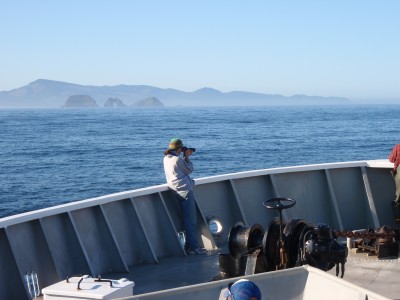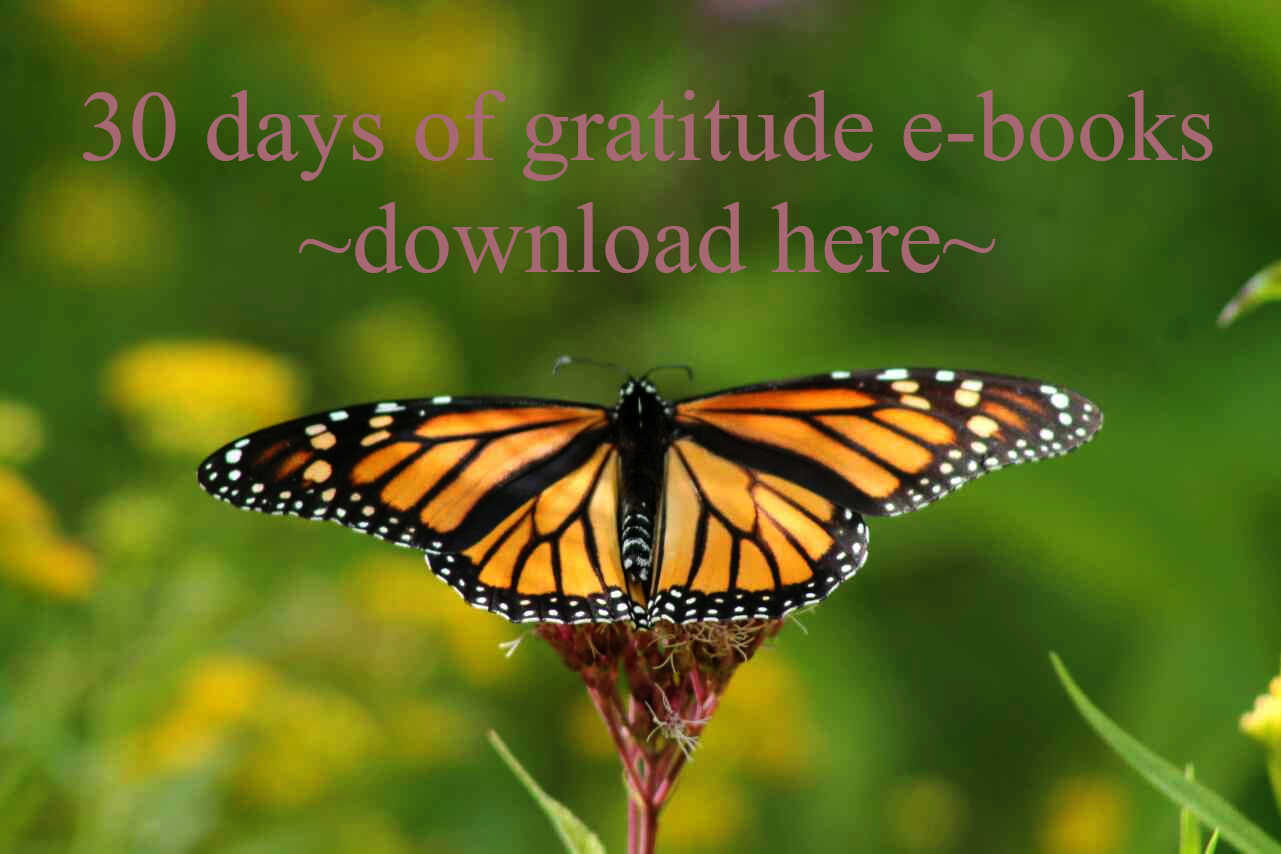that’s the edge of my yard, on the left, and the road we walk down to the bayfront. and a disposable diaper someone so kindly left behind at the tippy top of the hill. the two choices i have: deal with someone else’s hazardous waste or let nature deal with it. (nature has to deal with it either way, but i won’t let it go in that bay…)
that’s a black-footed albatross, who let me take his picture a month or so ago, 20 miles offshore. the black-footed albatross is listed as an endangered species. tsunamis flooding their breeding colonies in the tropical pacific, and volcanic eruptions on the same islands would be enough for these birds to contend with, but they also die by the thousands each year on longline fishing gear (though streamer lines are helping reduce seabird bycatch), suffer from oil spills, and fill their chicks’ bellies with plastic bits until they die of starvation.
those little blue-eyed wee beasties are Cancer magister magelopae, which in english means baby dungeness crabs. they’ve got some growing to do before they are going to be big enough to eat, but it is getting harder and harder for them to do the work of shell building in the ocean. the good news about the ocean and all this excess carbon dioxide we have been so diligently creating, is that the ocean has absorbed a fair amount, relieving the atmosphere of some of the burden. the bad news is that it is altering the chemistry of the ocean in ways that make it impossible for all those things in there that need lots of calcium carbonate to build their bodies (you know, crabs, oysters, clams, coral, pretty much just about everything in the ocean…) due to a process called ocean acidification. if you think sea level rise is scary… well, you should. but you should also learn about oa, because this is serious shit, people.
a baby of another species, this time humpback whale, saying, “mama, look at me, look at me! look what i can do! look what a big splash i can make!” (i might be projecting… there is a certain human youngster in my life wanting very much to be seen by me all the time these days.)
i’ve been passionate about whales for a long time, and i am not even sure where to begin anymore, when i try to sum up all the various perils they face. japanese “scientific” whaling, for instance. but as i’ve said before, it is a cop out to point the finger at other nations, when we, the united states, are responsible for so much devastation, both in the past and right now, today, and respond with such apathy, dragging our feet instead of making any real changes.

North Atlantic black right whale #1608, taken in 2004, probably hours before this animal’s death due to infection following gear entanglement. she was hanging at the surface (no longer feeding) and clearly emaciated.
“Ship strikes and entanglements are a threat to the endangered western North Atlantic right whale population which numbers around 300-400 animals. Five deaths and four entanglement cases were reported off the US coast between November 2009 and October 2010. The (Scientific) Committee again expressed grave concern and recommended that anthropogenic mortality should be reduced to zero as soon as possible.” I am quoting from the international whaling commission press release, its 64th annual meeting was just completed; see also this study from Nature in 2001 showing how this population cannot sustain this mortality rate. The right whale in the picture above is just the only entanglement victim that i have personally encountered, it is by no means the most recent or severe case, and far from the only one. The entire population of north atlantic right whales is photo-identified (by markings on their bodies, each individual is known) and you can find the entire species- all 300 or so individuals- pictured in the October 2008 issue of National Geographic- you should go to the library and hold the paper copy in your hands, the digital online version does not include the photos. it did take a fold-out page to accommodate the species, but, gulp. it’s sobering to see them all and hold them all in your hand like that. it’s probably more sobering for the folks who have been in the presence of each and every remaining member of that species, who get the reports of all these mortalities and check another whale off the list of potential for the species to make it, who hold their breath for how many new calves will make it up from the southern breeding grounds each spring to replace those that have been lost.
while i’m on a whale kick (haha, when am i not?), the blue whale is also at very serious risk from ship strikes. before humans started killing them, it’s estimated that 350,000 of them swam the world’s oceans. there are around 10,000 of them left, so “decimated” is an understatement. up to 5 blue whales are documented to be killed by ships each year, just off california. and those are only the known mortalities, the ones that are dragged into port on the prow of a ship, because unlike right whales, who float when killed, blue whales are negatively buoyant, and sink when they die. negatively buoyant. i think i kind of know the feeling.
from the great whale conservancy:
“It took decades to institute strong protections, including adjusted shipping lanes, ship speeds, and the establishment of protected areas for North Atlantic right whales, despite 60 years of “protected status” and the knowledge that 1/3 of the known mortalities every year resulted from ship strikes. The survival of the right whale population still hangs by a thread. We can’t afford to negotiate for decades on protecting blue whales in the Pacific.” (click that link for contacts about ways to get involved.)
so… i went to sea, and then i came back and have been trying to figure out what to say ever since. i feel like there must be something that should be said. for the first three days i was still rocking like i was back on the boat every time i moved, in a visceral “that was so not a wooden sailing ship” kind of way, so i waited. then i was away from the computer anyway, catching up with quinn, so i waited. i was waiting for film to be developed. i was waiting to post the beauty without muddling it up with a bunch of half-formed pleas to the world to stop fucking up the ocean. i was waiting so long my login would time out and i’d lose the few words i did manage to put together and shuffle around. and now i am still waiting for the right words to come.
mary at terrelectualism wrote a beautiful post about the state of the ocean report recently, in which she proposes the idea that bludgeoning friends and family with the paralyzing news of our oceans’ demise may be less effective an approach than coming from a place of love. i’ve been grappling with this for years, and i know i agree and want to embody a loving approach to saving the ocean. i want to. here’s what i’ve got so far:
“i love you. now stop fucking up my ocean.”
it needs finesse, i know. in all reality, my dear readers are the choir, at worst, and certainly don’t need bludgeoning or convincing. you’re already in the category of “those who are doing something about it” and you’re doing more all the time, just like me. the people who need to get on this bandwagon are unlikely to stumble across my little post here. so how can i help? my job (career scientist) feels… less and less relevant to solving the problem all the time. “you don’t need a weather man to know which way the wind blows.” we already know the ocean is screwed, you don’t need one more marine biologist to tell you. how much is it going to help to continue to measure more and more accurately exactly how screwed our biosphere is? we know what we need to do, we’re just not doing it. that is what feels so awful.
so, i mean, i love everyone, and i love me too, and i haven’t stopped driving my car yet, so i’m not even in a position to shove it down anyone’s throat even if i felt like taking that approach. but i do know more details about this crisis than your average american, and i want to do something with them besides bludgeon. would it help you to hear the more or less paralysis-inducing factoids, or is it pointless for me to churn them out? i guess what i’m hoping for is to break it down into the bits you need to know about the problem, but also to break down the solution into bite sized chunks that seem doable. how does this albatross tummies full of bottlecaps problem apply to me, and what specific thing can i do?
how can little old me do anything to prevent ship strikes of whales? negative buoyancy is not only acting on our largest dying species, i see it around me, acting on the hearts and souls of tireless defenders of this here planet of ours.
paralysis is a sign of trauma. we are traumatized people, this is a traumatized planet. i guess i’m here to say, it is possible to recover from trauma, at least to the point where you can stop succumbing to the paralysis. one can start to feel again, and not die from it. and pick up and go forward.
i’m committing myself to staying in the game. i’m not going to numb out, become complacent, ambivalent, apathetic…
“contented disquietude” was a writing assignment from high school, that has somehow clung onto the back of my brain all these years, like a burdock burr to a sock. i love phrases like that, seemingly contradictory, but more often than not, perfectly encapsulating a really, really familiar feeling of mine. going to sea last month was a lot like that. everything and nothing about it was exactly right for me, right where i was at that moment of time. if i strip it down to just the details of my job, and look at it superficially, it’s a great gig. we’re doing conservation-oriented science, what more could a nature loving marine biologist want in a job? but every time i break it down, the realities of this line of work seriously bum me out. for example, running a huge diesel engine non-stop for ten days to propel a 130 foot steel boat through the water. for conservation. even leaving behind my four year old son for 10 days, somehow seems to fall more on the side of the scale labeled “part of the problem” than that labeled “part of the solution.” human mamas and four year olds and baby octopi and albatross fledglings and right whales… and ten million other victims, do we really need more data points to let us know we have a major out of control problem on our hands?
i spent last work week cutting up some of the juvenile (yup, baby, yup, endangered) salmon we have collected this year during the 14th year of the ongoing survey. don’t get me wrong, a lot of amazing work has been done in 14 years, and our project has done a lot for science, for discovering what goes on for these fish in their first days in salt water, which before our study came along was a big black box. (i can wax poetic another time about black boxes and the prudence of leaving some things a mystery… or just implore you to read wendell berry) the group i work for is now consulted as one of the most accurate (if not the most) and earliest predictors of salmon returns– we let managers know in january what they are likely to see the following summer and fall in terms of adult salmon returning to spawn (and be harvested by commercial fishers en route). on my cruise, we “sampled” salmon number 30,000 for the project, a major milestone. should i be proud to have held that individual fish in my hands? should i be ashamed, because that fish was an individual, a life, a significant being, and that 29,999 individuials had already been sacrificed in the name of science? i ponder all this as i snack on the smoked “jumbo” juvenile salmon i rescued from the trash bags after its pertinent organs and fins were collected for further analyses, and whisked home for all the free protein content. (contented disquietude, see what i mean?)
some of the other fish we sampled last week were caught as part of a study to test whether a mammal excluder device attached to our trawl net would have an impact on the number of our target fish we are able to catch… the study was dubbed, tongue in cheek, m.e.s.s. for mammal excluder special study, and it has been fraught with logistical difficulties. going out on a limb here, i have a hunch that no one i work for or with would want this sort of thing published on anyone’s blog, and yet i feel compelled to let the world know what government conservation biology looks like on the inside. and let me be clear: nobody here wants to catch marine mammals while we’re fishing for salmon. we had 3 of our crew on mammal watch during every second of every trawl, and our chief scientist, whose ass is on the line if a mammal is caught, was very consistent at making sure we did this job with due vigilance. the excluder device was tested as an effort of good faith, we haven’t been required to use one (yet) but in truth the consensus is that we are just biding our time until an exception is added into the federal marine mammal protection act, so that research ships are given the same treatment as commercial vessels when a mammal is inadvertently caught: a quota, an “accepted take” of unintended “bycatch” that is dealt with through mandatory reporting and “release” at sea. wow, can you say conflicted? i work on a study that has all by itself killed numerous marine mammals (thank jesus buddha and allah it did not happen while i was on board) and isn’t just by default now using an excluder device? to me, it seems like research vessels maybe should be held to higher standards- if we are going to recommend to managers that measures like excluder devices be used, shouldn’t we be using them? commercial captains do not want mammals in their nets any more than we do, even if they see mammals as nothing but the competition, they don’t need the hassle and the damage to their nets. we know none of us want to catch them, we know that we all do, from time to time, and we have options we can try… but, negatively buoyant as things are, we sink to the lowest common denominator of an “accepted take”.
so it’s taken me a long time to feel anywhere close to posting this, and i still feel i’ve done a poor job of setting the tone i’m trying to set, and an even worse job of summing things up succinctly. you know, like a good scientist ought to. i guess if you’re still with me though, you might have some inkling of what i’m feeling on all this… i just want them to keep living. i just want the ocean to keep living. and i think that is what i need to remember now more than ever. i’m not the only one who feels this sinking feeling. i’m not alone.























in speaking for myself, i don't need you to sum it up. if it's summed up, it's easily put away and this is part of the trick of staying awake in disquietude…the whole thing is restless, edgey, unresolved, and it's HAPPENING…it's all happening right now. if i could add to your sentence it would be "i love you. now pull your head out of your ass, grab my hand and stop fucking up the oceans."
thank you for sharing about this, i am especially glad to read it since we have been in (brief) conversation around it. i personally don't need more facts and figures, because it is truly ripping me apart and all i feel like i am doing lately is putting myself back together, over and over. what helps me is to know i'm not alone. i need to hear your process, your worries and your pain and your hope, or lack of it. i have more thoughts on this that i will contact you about, but for now i will again say…thank you.
…no…you are not alone with the sinking feeling….